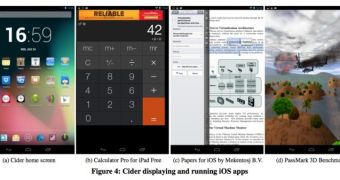Your days of bragging that a certain app is iOS exclusive are numbered. A handful of students at Columbia University have come up with a hack that tricks iOS binaries into thinking they’re running on Apple hardware to port them over to Android.
Dubbed Cider (just like the OS X game porting technology, but a different thing altogether), the tool is basically an operating system compatibility architecture that can run applications built for different mobile ecosystems (not just iOS or Android) on a single device.
Jeremy Andrus, Alexander Van’t Hof, Naser AlDuaij, Christoffer Dall, Nicolas Viennot, and Jason Nieh put together a neat PDF to explain the project, noting that “Cider enhances the domestic operating system, Android, of a device with kernel-managed, per-thread personas to mimic the application binary interface of a foreign operating system, iOS, enabling it to run unmodified foreign binaries.”
The students further explain that the hack uses “a novel combination of binary compatibility techniques including two new mechanisms: compile-time code adaptation, and diplomatic functions.”
“Compile-time code adaptation enables existing unmodified foreign source code to be reused in the domestic kernel, reducing implementation effort required to support multiple binary interfaces for executing domestic and foreign applications,” the students note.
According to the documentation, apps running in the Cider environment can use domestic libraries to access proprietary software and hardware interfaces because diplomatic functions leverage perthread personas.
After building their Cider prototype, the tinkerers demonstrated that it can run unmodified iOS and Android applications on a Google Nexus tablet running the latest version of Android without imposing too much performance overhead.
Notably, Cider is the first full-fledged system that can run unmodified iOS binaries on non-Apple hardware.
“Many approaches have tried to run apps from multiple OSes on the same hardware, though primarily in the con- text of desktop computers, not mobile devices,” the group proudly states.
If the tool gets packaged into a user-friendly app or emulation/virtualization environment, it could pose a threat to Apple’s iTunes Store business, as Android users would no longer be left longing for apps that are exclusively tailored for iOS devices.
However, it should also be noted that at this point Cider suffers from a great deal of compatibility issues, mainly posed by the hardware differences between Apple’s iDevices and Android devices. But these things generally take a lot of time without a team of a few dozen software engineers, so don’t expect the finalized software to launch publicly anytime soon.

 14 DAY TRIAL //
14 DAY TRIAL // 